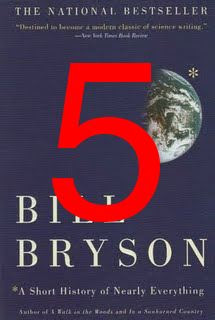 “There are ninety-two naturally occurring elements on Earth….
“There are ninety-two naturally occurring elements on Earth….“As you might expect, oxygen is our most abundant element, accounting for just under 50 percent of the Earth’s crust, but after that the relative abundances are often surprising. Who would guess, for instance, that silicon is the second most common element on Earth or that titanium is tenth? Abundance has little to do with their familiarity or utility to us.
Many of the more obscure elements are actually more common that the better-known ones.
“Abundance also has little to do with ease of detection. Aluminum is the fourth most common element on Earth, accounted for nearly a tenth of everything that’s underneath your feet, but its existence wasn’t even suspected until it was discovered in the nineteenth century by Humphry Davy, and for a long time after that it was treated as rare and precious. Congress nearly put a shiny lining of aluminum foil atop the Washington Monument to show what a classy and prosperous nation we had become, and the French imperial family in the same period discarded the state silver dinner service and replaced it with an aluminum one. The fashion was cutting edge even if the knives weren’t.
“Nor does abundance necessarily relate to importance. Carbon is only the fifteenth most common element, accounting for a very modest 0.048 percent of Earth’s crust, but we would be lost without it. What sets the carbon atom apart is that it is shamelessly promiscuous. It is the party animal of the atomic world, latching on to many other atoms (including itself) and holding tight, forming molecular conga lines of hearty robustness—the very trick of nature necessary to building proteins and DNA…. Of every 200 atoms in your body, 126 are hydrogen, 51 are oxygen, and just 19 are carbon.
“Other elements are critical not for creating life but for sustaining it. We need iron to manufacture hemoglobin, and with it we would die. Cobalt is necessary for the creation of Vitamin B12. Potassium and a very little sodium are literally good for your nerves. Molybdenum, manganese, and vanadium help you keep your enzymes purring. Zinc—bless it—oxidizes alcohol.
“We have evolved to utilize or tolerate these things—we could hardly be here otherwise—but even then we live within narrow ranges of acceptance. Selenium is vital to all of us, but take in just a little too much and it will be the last thing you ever do.”
Have I convinced you to just go out and get this book for youself?

2 comments:
Do you want to know something else that's interesting? Helium is a limited resource. When it's gone, it's just gone. So, do you think we save it for important things? No. We put it in party balloons. A little bit crazy if you ask me.
BTW, not sure where I heard that...
Lindy,
Do you have an address where I could send a copy to you? When I taught in Costa Rica (1984), a friend sent a care package with her oats and M&M infused granola trail mix to me--surface, no less!!! And inspite of the odds against it, it arrived and I retrieved it from some freaking industrial warehouse on the totally BAD side of town (required crossing on foot the largest train rail yard in that nation) after only two utterly innocent and ill-advised visits!
The first time I showed up, they acted like I was an alien from another world, like anyone would actually respond to a postal notice and expect to discover the item there. I did this not even knowing what it was--but once acquired, and not withstanding months of travel in ziplock bags in unimaginable storage conditions--the chewy, honey, cinnamon goodness of it, even left my supervisor speechless! I can't imagine that the odds for a book sent to present day china could be any worse! And I'm happy to chance it.
As to Helium...where would it go? Both breathing it to talk silly and filling balloons with it, only releases it to the atmosphere... Anyway, not to worry. Be well, and enjoy your days!
Post a Comment